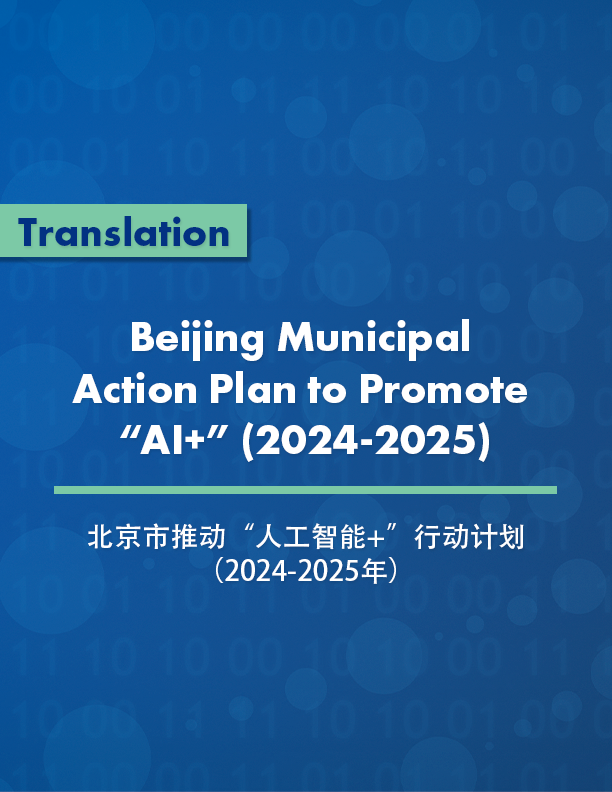The following Beijing Municipal industrial policy describes how the city government plans to integrate AI into a wide variety of industries in 2024 and 2025. These industries and sectors include robotics, education, healthcare, scientific research, spatial computing, digital marketing, Party propaganda, the power grid, surveillance, and censorship, among others.
An archived version of the Chinese source text is available online at: https://perma.cc/79PX-RCY3
Beijing Municipal Action Plan to Promote “AI+” (2024-2025)
The Beijing Municipal Commission of Development and Reform, the Beijing Municipal Bureau of Economy and Information Technology, and the Beijing Municipal Science & Technology Commission, and the Administrative Commission of Zhongguancun Science Park, in accordance with relevant national and municipal policies, have jointly formulated the Beijing Municipal Action Plan to Promote “AI+” (2024-2025) in order to deeply implement the national “AI+” strategic action plans, fully implement the spirit of documents including the Beijing Implementation Plan for Accelerating Construction of Sources of Artificial Intelligence Innovation with Global Influence (2023-2025) and Certain Measures to Promote the Innovative Development of General Purpose Artificial Intelligence in Beijing Municipality, seize the technological innovation opportunities in artificial intelligence (AI) based on large models, use applications to feed back into large model technology iteration, drive the industry’s development, accelerate the incubation of new productive forces (新质生产力), and make every effort to build Beijing into a benchmark city for the global digital economy.
I. Development goals
Giving full play to Beijing’s comprehensive advantages, including strong innovation momentum, diversified and assured computing power (“compute”), massive data supply, and abundant application scenarios, and adhering to the principles of being guided by the government, being innovation-driven and application-led, and open cooperation, by organizing major project research, matching the supply and demand of resources, and piloting characteristic scenarios, we will significantly enhance independent innovation (自主创新) capability in large models, promote the formation of standardized, large-scale, and cross-cutting collaborative application implementation paths, and thereby accelerate the intelligentization (智能化) of thousands of industries. By the end of 2025, through the implementation of five benchmark application projects that are on a par with the world’s leading level, the organization of ten nationally leading demonstrative application projects, and the promotion of a number of commercialized application achievements with broad application prospects, we will strive to form 3-5 advanced, usable, and independently controllable (自主可控) foundation model products, 100 excellent industry large model products, and 1,000 industry success stories. We will take the lead in building an AI-native city and push Beijing to become a global source of AI innovation and an AI application center.
II. Benchmark application projects
Relying on the capital’s superior industry resources and S&T research and development capabilities, a number of major projects of a comprehensive and benchmark nature will be organized and implemented in fields such as robotics, education, healthcare, culture, and transportation to promote breakthroughs in core large model theory and technology, and strengthen AI engineering ability, so as to raise the technological level and service quality of key industries, and build a cross-industry and interdisciplinary collaborative innovation organizational model, thereby forming a new ecosystem for large model industry applications.
To view the rest of this translation, download the pdf below.
